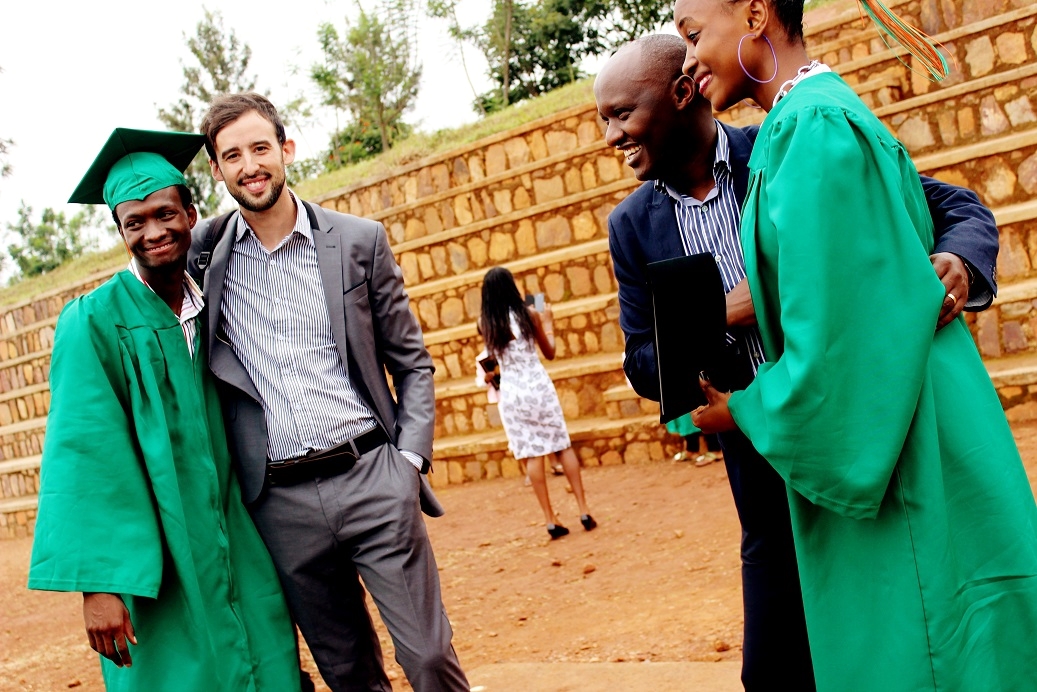1. Travelling everywhere by car
Rwanda is fairly easy to get around via public transport – as long as you don’t mind getting a little uncomfortable every now and again. For longer journeys, Rwanda offers reliable and somewhat character building bus links to all major towns and cities. For shorter journeys, motorbike taxis are a quick and affordable method for getting from A to B. Aaaah the moto taxi. The nimble, traffic weaving bane of the male reproductive system. My own experiences ranged from leisurely drives through the Rwandan capital to ball-crushing off-road hell rides of death.
2. Handshake greetings
In Blighty, nothing is more proper than greeting fellow citizens with a good old-fashioned knuckle-crippling handshake. Indeed, many of us might judge the strength of one’s character by the rigidity of their shake or the firmness of their grip. In Rwanda, however, a simple strong handshake just will not do. Expect to be embraced by Rwandans with a warm hug followed by three quick kisses and the prolonged holding of hands.
3. Whinging about the weather
Let’s face it, most of us Brits love a good old moan and there’s nothing more reliable than the consistently inconsistent British weather to get us all grumbling. I had to find something else to grouch about in Rwanda, however, as the country boasts spectacular weather pretty much all year round.
4. Eating junk food
Rice, beans and potatoes comprised more or less my entire diet during the two years I spent living in a rural village in Rwanda. Every fortnight I’d have the chance to grab some western style food in Kigali, but I slowly started to enjoy eating a simpler, healthier diet.
5. Taking water for granted
Lack of sanitised water and numerous outages made me really appreciate how good we have it in the UK and across most of the western world. As Monty Python’s four Yorkshire men might have said, showers were, “luxury”, as was the opportunity to flush the toilet or wash the dishes during periods with little rainfall. Sterilising each glass of water before drinking became routine and hand washing my clothes in rainwater was fairly commonplace.
6. Keeping up with the football
Alright, so I didn’t totally lose the plot. I managed to locate a bar in Kigali that showed Premier League matches, but I had to make do with catching games every other weekend. Before moving to Rwanda, I could more or less state the dates, times and opponents of at least the next three matches that involved my team. But within a few months it got to the point where I was checking results a few days after each game took place.
7. Strict time keeping
During the first few months I spent in Rwanda, I found myself getting overly frustrated with the cultural differences regarding time management. Slowly but surely I adapted and came to peace with the fact that most events would start 1-2 hours after the scheduled time.
8. Feeling like I’ll be deemed insane for greeting random strangers
While the people of smaller towns and villages in Britain seem to have retained their tendencies toward random “how-do-you-dos?”, it would be fair to say that one might be considered an oddball if they were to start chatting to random folk in larger towns and cities. In Rwanda’s capital – Kigali, no such judgement would be made.
9. Watching TV
Due to the abundance of power outages, and perhaps more significantly the fact that I didn’t own a television, I spent my free time more productively by reading books, photographing wildlife and cooking meals from scratch.
10. Expecting to find everything I need at the supermarket
Understandably, it would often be difficult to get hold of certain items in any of Rwanda’s supermarkets. After my first proper shopping trip, I really began to appreciate the variety of options available in British stores. It was from that day forth that I vowed never to take caramelised onion flavoured houmous for granted.
11. Unnecessary worrying
We all worry about things from time to time, but in reality most issues we allow ourselves to become stressed or anxious over aren’t really worth it. The year I spent in Rwanda entailed living and working with some of the poorest people in the country, yet they were also some of the happiest, care-free people I’ve ever met. The wonderful and inspirational people of Rwanda taught me so much about letting go of unnecessary worries.
12. Disconnection from the natural environment
In Britain, most of us are far too busy pottering about our days to pay any attention to the wildlife that surrounds us. In Rwanda, however, the biodiversity is so rich and colourful that it’s almost impossible not to get distracted by the enchanting array of flora and fauna that inhabits the beautiful green landscapes.




